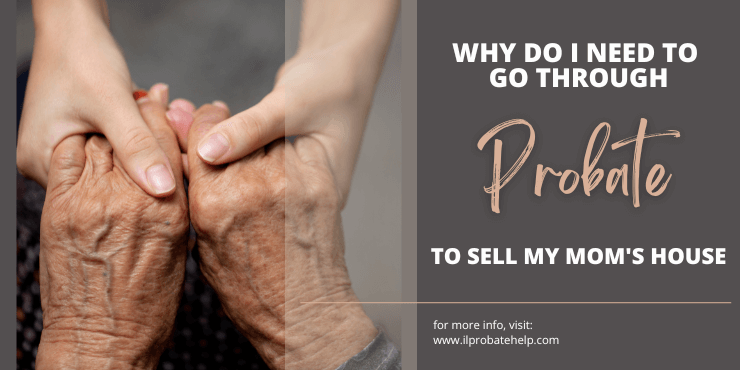
Selling your mom’s house during probate can be a confusing and overwhelming process. It is important to understand the process and steps required to ensure that the sale of her home goes as smoothly as possible.
This blog post will provide an overview of the probate process, discuss how you should approach selling your mom’s house, and offer tips for getting the most out of the sale.
Understanding Probate is Essential When it Comes to Selling a Parent’s Home.
The first step in understanding probate is to know the definition of it.
Probate is the legal process of transferring ownership of assets from a parent to their adult children or beneficiaries. This includes real estate, bank accounts, investments, and other property owned by the parent. In order to sell a parent’s house you will need to go through probate in order to transfer ownership from her name into yours or another heir/beneficiary’s name.
Probate is typically required when a person dies with or without a will. The laws regarding probate vary by state, but in general, probate is required when the deceased person’s assets are valued over a certain amount or if the deceased owned real property.
For example: In Illinois, probate is required if a person dies with or without a will and solely owned assets valued at more than $100,000. It is important to note that the probate laws in Illinois are subject to change and it is always recommended to seek legal counsel for specific information.
Probate can be lengthy and complex, involving various steps such as notifying beneficiaries and creditors, collecting and inventorying the deceased person’s assets, paying off debts, and distributing the remaining assets to beneficiaries.
It is also important to note that during probate, the assets of the deceased person’s estate are typically frozen, so it is not possible to sell or transfer any assets until probate has been initiated and the personal representative of the estate has received the legal authority from the court to sell or transfer the assets.
Don’t Leave The Home Unprotected

When a parent passes away, it is important to remember to review their homeowners insurance policy to ensure that the property and assets are properly protected.
More often than not, a standard insurance policy will not cover a home that is vacant for an extended period of time.
There are several reasons to make sure the right coverage is in place:
Protection against damage:
The home is more susceptible to damage from weather, vandalism, and theft. Having the extra home insurance coverage provides protection against these types of damage, ensuring that the home is properly protected while it is unoccupied.
Liability coverage:
Vacant homes can also pose a liability risk, as they may not be properly maintained and may be a hazard to passersby. Vacant home insurance provides liability coverage in case someone is injured on the property.
Protection of assets:
A vacant home represents a significant investment, and it is important to protect that investment by having the appropriate insurance coverage. Vacant home insurance can provide peace of mind knowing that the home is protected while it is unoccupied.
Protection during probate:
When probate is still ongoing, the additional home insurance can provide protection while the home is unoccupied and awaiting to be sold or transferred to the beneficiaries.
It is important to speak with the insurance agent who can provide the right coverage for an unoccupied home.
Selling a House During Probate

Once you have been given permission by the court to sell your mom’s house, there are several steps you should take before putting it on the market.
Hire a real estate agent with probate experience:
An experienced real estate agent can provide several benefits when dealing with a probate case. They can help you identify any potential issues that could arise with the property, advise on necessary repairs or renovations, identify potential buyers or renters quickly, and negotiate deals on your behalf.
They can help market and sell the house effectively and can help you understand the local market conditions. Additionally, they will understand how to determine a fair list price, properly handle paperwork associated with transferring ownership or renting out the property so that everything goes according to plan without any hiccups along the way.
Make necessary repairs and improvements:
It is important to present the house in the best possible condition to potential buyers. Make any necessary repairs and improvements, such as painting, landscaping, and cleaning.
Be transparent about the probate process:
Be honest with potential buyers about the fact that the house is being sold during probate. This can help prevent delays or complications later on in the process.
Be prepared for a longer sale process:
In some cases, probate sales can take longer than traditional sales – depending on the situation, so it is important to be patient and prepared for a longer process.
Communicate with family:
Keep in touch with the family members and keep them informed about the sale process. It is important that everyone involved has access to accurate information so they aren’t left in the dark.
Be transparent about any potential delays or problems that may arise during the selling process, as well as any changes in plans or decisions. This can help prevent disputes caused by lack of communication.
It can be helpful to create an open dialogue with your family so they feel comfortable asking questions and expressing any concerns they may have. Try to avoid getting into debates over specific details, instead focusing on providing factual information and helping them understand why certain decisions were made by you.
Encourage members of your family to speak up if they have something to say, but remain respectful and non-judgmental throughout all conversations related to the selling process.
Be Flexible:
Dealing with an inherited home requires patience. Be open to negotiations and be willing to consider offers that are below the asking price. Delays may occur with filing documents and getting appraisals—it may take some time before everything is finalized.
Be patient and willing to adjust deadlines when needed so that everyone involved feels comfortable with moving forward with the sale.
Get a fair market value appraisal:
Get a fair market value appraisal of the property to help you price it appropriately and to help the court approve the sale.
By following these tips, you can help ensure a successful sale of the house during probate. Remember that it is always important to seek guidance and representation of a probate attorney and a real estate agent who has experience with probate sales.
Handling Your Mom’s Personal Belongings

Losing a parent is never easy. In addition to dealing with the grief and sadness that comes with such a loss, you also have to figure out what to do with all of your mom’s personal belongings. If your mom’s house is filled with her things, you may be wondering what the best course of action is.
Should you keep everything? Should you throw everything away? What if you can’t decide what to do?
The Importance of Making Decisions Based on What Will Bring You Comfort
One of the most important things to keep in mind when handling your mom’s personal belongings is that you should make decisions based on what will bring you comfort.
Do whatever feels right for you. If keeping certain items will help you feel closer to your mom, then by all means, keep them. But if going through her things and getting rid of them will help you start to heal, then that’s okay too.
There is no right or wrong answer here. Just do whatever feels right for you in the moment.
How to Deal With Sentimental Items
Some of your mom’s belongings may be more sentimental than others. For example, you may want to keep her wedding dress or her favorite pair of earrings. But what do you do with less sentimental items, like her clothes or her cookware?
If you’re having trouble deciding what to do with these items, here are a few ideas:
– Donate them to charity
– Give them away to family or friends
– Have an Estate sale
An estate sale can be a beneficial way to remove the personal belongings of a parent after they have passed away. An Estate sale company are experts in handling the sale of personal belongings and can help ensure that the sale is carried out smoothly and efficiently.
They can handle everything from inventorying and preparing items for sale, to advertising and promoting the sale, to collecting payment and disbursing proceeds.
Hiring a third party professional will help you avoid the emotional stress of letting go, and selling your parents personal belongings. A sale can help ensure that the assets of the estate are distributed fairly among the beneficiaries. It can also help prevent disputes among family members over who gets what.
They also can help determine the value of the assets, and can price them appropriately to maximize their value. This can ensure that the beneficiaries receive the most possible from the sale of the assets.
– Repurpose them into something new
Again, there is no right or wrong answer here. It’s up to you to decide what you want to do with these items.
When It’s Okay To Let Go Of Things
There may be some items that you simply can’t bear to part with—and that’s perfectly understandable. But there may also be some items that are taking up space and causing clutter without serving any real purpose.
If that’s the case, then it’s okay to let go of those things. Remember, your goal should be to surround yourself with things that make you happy and help you feel at peace. If certain items are not doing that, then it’s okay to get rid of them—no matter how much sentiment is attached to them.
Losing a parent is never easy—but it can be even more difficult when faced with the task of handling their personal belongings. Keep these tips in mind as you begin the process of sorting through your mom’s belongings and deciding what to do with them. And remember, there is no right or wrong answer here—just do whatever feels right for you in the moment.
Opting To Sell The House As-Is

When your Mom passed away and left you her home, you may be wondering what to do with it. You could try to put it on the market as-is, or you could make some repairs and upgrades to increase its value. It’s an important decision—and a difficult one. You’ll need to determine which one makes sense to you.
If you’re looking to sell quickly, selling the house as-is could be the answer you’re looking for. Let’s look at what it takes to sell your mom’s house as-is.
Determine Your Selling Timeline
Before you start marketing your mom’s house “as is,” decide how quickly you want it to sell. Do you need (or want) it gone in a week? Or do you have some wiggle room with a month or two?
Knowing this will help determine which buyers are best suited for the sale and what steps need to be taken next.
Choose Your Asking Price Carefully
One of the most important aspects of selling any home is pricing it correctly for the market. Even though your mom’s house needs work, if you price it too low, buyers might think something is wrong with it and pass on making a cash offer.
On the other hand, if you overprice it, potential buyers won’t even consider making an offer. Work with local real estate agents experienced in selling homes as-is so they can give you an appropriate listing price based on current market conditions and comparable properties in the area.

Marketing To The Right Buyers
Consider who would be interested in buying a property “as is.” A cash buyer usually specialize in buying fixer-uppers because they’re willing to buy them without making any repairs or renovations first. This makes them ideal candidates for buying your mom’s house as-is since they don’t need financing from a bank like traditional buyers do.
You should also consider targeting other buyers who are knowledgeable about renovation costs so they know what kind of investment they’d have to make after purchasing your mom’s house—like contractors or flippers who specialize in turning homes like yours into beautiful properties worthy of top dollar resale prices.
But this option does come with a price. A cash buyer typically will not pay fair market value, generally they will offer you less than fair market value. One of the best ways to find a cash buyer is to ask a realtor in your area who is well connected. They may know of someone who is interested in buying the house that will not require you to make any repairs.
Selling your parent’s home as-is can have both pros and cons depending on your situation and needs. Ultimately, the decision should come down to what works best for you cost wise and time wise. If necessary repairs would cost more than what potential buyers are likely willing to pay for them when added onto their offer price—or if time is of the essence—then selling as-is might be the right choice for you. Otherwise, investing in updating the property may end up being worth it in the long run.
Consider all these factors before making a decision either way.
What happens to the home sale proceeds after it’s sold?

The Estate Executor
The first step in determining where the proceeds from your parents house goes is understanding who is responsible for distributing those funds. The estate executor, who has been appointed by either the court or by the deceased, is responsible for handling all financial affairs associated with the estate.
This includes selling any real estate owned by the decedent and distributing any proceeds acquired through that sale as well as collecting debts owed to the estate, paying legitimate claims against it, and filing all necessary tax returns on behalf of the deceased.
Distribution
Once all of these tasks have been completed, it’s time for distribution of any remaining assets. The executor will then distribute assets according to instructions stated in either a will or trust document if there was one created before death or according to state laws governing intestate succession if there was no prior documentation providing instructions on how assets should be distributed after death.
After distribution has been approved by either a probate court or other appropriate court depending on your state’s laws, assets are then distributed accordingly—usually in cash via check or bank transfer—to beneficiaries named in documents outlining distributions such as wills and trusts or those determined by intestate succession laws.
Regardless of whether you are named as an heir in a will or trust document or you are entitled to receive inheritance due to intestate succession laws, understanding what happens with proceeds from selling your parents house is essential knowledge for anyone going through this process.
When handled properly, an executor can ensure that all relevant taxes are paid and that heirs receive their fair share of inheritance in accordance with applicable law. If you have questions about what happens after your loved one passes away, contact an experienced attorney who can provide guidance through this difficult time.

Final Thoughts:
Selling a house during probate does not have to be stressful or overwhelming if you have the right information and guidance upfront. Understanding the legal requirements involved in transferring ownership of an asset such as your parent’s home is essential for making sure that everything goes as smoothly as possible throughout this process.
Finding an experienced real estate agent who understands these laws can also make a big difference in how quickly and easily everything goes. With some research, patience, and proper guidance, selling your mom’s house during probate should not be too difficult or time consuming.
If you would like more information on the probate process in Illinois, or if you need a reference for a probate attorney. Please feel free to contact me. I would be happy to help you.
My name is Maria Mastrolonardo, I am an Illinois Certified Probate Real Estate Specialist with RE/MAX Enterprises. This is ALL I do; I help guide families through the process of selling real estate in probate and I would be happy to help you as well.
Call me today at: (630) 248-6077, or contact me here
